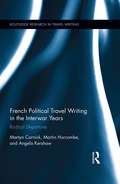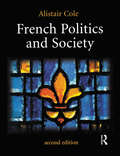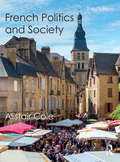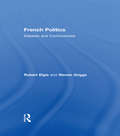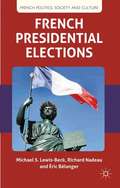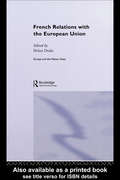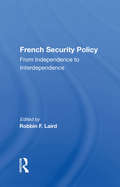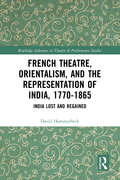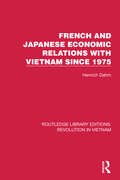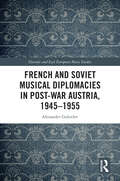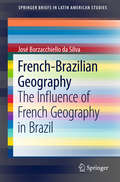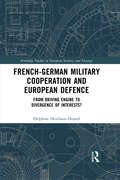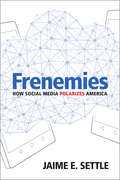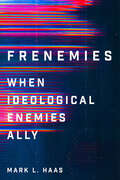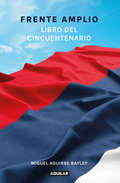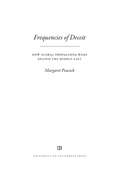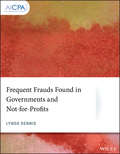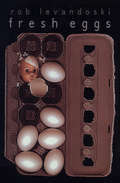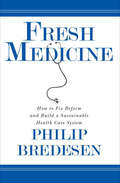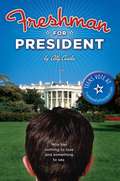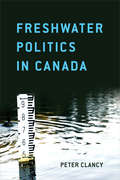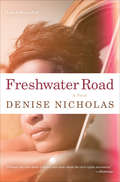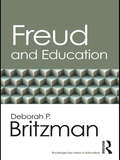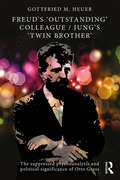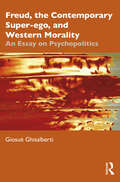- Table View
- List View
French Political Travel Writing in the Interwar Years: Radical Departures (Routledge Research in Travel Writing)
by Angela Kershaw Martyn Cornick Martin HurcombeThis book studies travel writing produced by French authors between the two World Wars following visits to authoritarian regimes in Europe and the Union of Soviet Socialist Republics (USSR). It sheds new light on the phenomenon of French political travel in this period by considering the well-documented appeal of Soviet communism for French intellectuals alongside their interest in other radical regimes which have been much less studied: fascist Italy, the Iberian dictatorships and Nazi Germany. Through analyses of the travel writing produced as a result of such visits, the book gauges the appeal of these forms of authoritarianism for inter-war French intellectuals from a broad political spectrum. It examines not only those whose political sympathies with the extreme right or extreme left were already publicly known, but also non-aligned intellectuals who were interested in political models that offered an apparently radical alternative to the French Third Republic. This study shows how travel writing provided a space for reflection on the lessons France might learn from the radical political experiments of the inter-war years. It argues that such writing can usefully be read as a form of utopian thinking, distinguishing this from colloquial understandings of utopia as an ideal location. Utopianism is understood neither as a fantasy ungrounded in the real nor as a dangerously totalitarian ideal, but, in line with Karl Mannheim, Paul Ricœur, and Ruth Levitas, as a form of non-congruence with the real that it seeks to transcend. The utopianism of French political travel writing is seen to lie not in the attempt to portray the destination visited as utopia, but rather in the pursuit of a dialogue with radical political alterity.
French Politics and Society
by Alistair ColeAssuming no previous knowledge and concentrating on the post-1981 era, this book introduces the fundamentals of French government and society. Covering a broad spectrum of topics, French Politics and Society 2nd Edition follows a logical structure and framework for analysis, providing an excellent description of French institutions, access to background information and discussions of historical developments, political forces, public policy, and the evolution of important aspects of French society.
French Politics and Society
by Alistair ColeFrench Politics and Society is the ideal companion for all students of France and French politics with a strong reputation for its lucidity and lively exposition of the French polity. This third edition remains a highly readable text and offers a broad, critical and comprehensive understanding of French politics. The book provides an excellent description of French institutions and ensures readers access to background information through discussing historical developments, political forces, public policy, and the evolution of important aspects of French society. Key updates for the third edition include: extensive updates including the Chirac, Sarkozy and Hollande presidencies; inclusion of constitutional and state reform coverage since 2008; the French party system and evolution of the French left and right; more on France’s positioning with regards to Brussels and the impact of the European economic crisis. French Politics and Society is essential reading for all undergraduates studying French politics, French studies, European studies or comparative politics.
French Politics: Debates and Controversies
by Steven Griggs Robert ElgieAccessible, up-to-date and comprehensive, this is an essential introduction to the French political system. Featuring detailed analysis of the most important debates and controversies concerning French politics today, the expert authors conclude that study of this subject is being transformed in response to a changing global, European and domestic environment. Includes coverage of: * the relationship between president and prime minister * voting behaviour * European integration * the changing parameters of state intervention.
French Presidential Elections
by Michael S. Lewis-Beck Richard Nadeau Éric BélangerAn original and comprehensive study of the sociological and psychological forces driving individual choices in French Presidential elections. Based on a unique comparative analysis of four French presidential contests over the last two decades, this book presents a rigorous examination of long-term and short-term voter motivations.
French Relations with the European Union (Europe and the Nation State #Vol. 8)
by Helen DrakeThis scholarly work examines how key actors within French politics and society have related to the challenges and opportunities posed by the European Union, and how these relations have driven or hindered change in France. The collection invites the reader to explore below the surface image of a France troubled by its relations with the EU in the post-Cold War era, and see the dynamics of change in empirical detail. Each chapter offers insights into specific aspects of the France-EU relationship, including: the characteristics of Euroscepticism à la française amongst the electorate and political parties the dynamics of change in the political, media and legal establishments in their dealings with the EU the priorities for labour, business and la vie associative in their relations with French decision-makers regarding the EU.
French Security Policy: From Independence To Interdependence
by Robbin F. LairdBeginning with a look at continuity and change in French policy since de Gaulle, this book presents the evolution of French security policy in the 1970s and 1980s. Dr. Laird pays special attention to the French nuclear modernization process and to the trend in the last two decades toward a greater emphasis on security interdependence within the Western alliance at the expense of the classic Gaullist stance of independence. He examines the major dimensions of French security policy, particularly French nuclear employment policy and doctrine, the Franco-German relationship, and France's role in Europe and in East-West relations. The book features the first-time translation of some of the most significant recent papers by leading French analysts of security affairs.
French Theatre, Orientalism, and the Representation of India, 1770-1865: India Lost and Regained (Routledge Advances in Theatre & Performance Studies)
by David HammerbeckThis book examines the French theatricalization of India from 1770 to 1865 and how a range of plays not only represented India to the French viewing public but also staged issues within French culture including colonialism, imperialism, race, gender, and national politics. Through examining these texts and available performance history, and incorporating historical texts and cultural theory, David Hammerback analyses these works to illustrate a complex of cultural representations: some contested Orientalism, some participated in Western colonialist discourses, while some can be placed somewhere between these two markers of ideology in Western culture and the arts. He also assesses the works which participated in shaping the theatrical face of Western hegemony, ones directly participating in Orientalism as delineated by Edward Said and others. This book will be of great interest to students and scholars in theatre, French literature, history and cultural studies.
French and Japanese Economic Relations with Vietnam Since 1975 (Routledge Library Editions: Revolution in Vietnam #2)
by Henrich DahmThis book, first published in 1999, compares the strategies of France and Japan in trying to win economic and political influence in the newly emerging Vietnam, which opened to the international community only after the Vietnamese Communist Party had started economic reforms in 1986. These reforms are aimed at transforming the country’s centrally-planned economy into a government-controlled market economy and at opening Vietnam to foreign capital, technology and know-how. This setting provides a unique opportunity for comparing the strategies of two nations from different continents in conducting their economic relations with a unified Vietnam.
French and Soviet Musical Diplomacies in Post-War Austria, 1945-1955 (Slavonic and East European Music Studies)
by Alexander GolovlevFrench and Soviet Musical Diplomacies in Post-War Austria, 1945-1955 investigates how promoting 'national' music and musicians was used as an important asset by France and the USSR in post-Nazi Austria, covering music’s role in international relations at various levels, within changing power frameworks. Bridging international relations, musical sociology, media studies, and Cold War history, four incisive chapters examine the crossroads of Soviet, French, and Austrian cultural politics and discourse-building, presented in two parts - institutions of musical diplomacy: Soviet and French cultural diplomats in comparison; sounds of music coming to Austria: Soviet and French musicians on tour. Using a communication- and media-oriented approach, this study casts new light, firstly, on the interpretative power of 'receiving' publics and, secondly, on the role of cultural transmitters at different levels. This is a valuable study for those specialising in Russian and East European music and music and politics. It will also appeal to cultural historians and all those interested in the intersections between music, international relations, and Cold War history.
French-Brazilian Geography
by José Borzacchiello da SilvaThis book analyses the development of geography as a scientific discipline in Brazil, highlighting how the established partnerships with French geographers have helped shape scientific progress in the country. It connects economic development and politics with the study of geography in Brazil. The author, José Borzacchiello da Silva, includes interviews with renowned French geographers, documenting their insight into the French contribution to geography in Brazil. The research partnerships established have been significant to the foundation and growth of the discipline in the country.
French-German Military Cooperation and European Defence: From Driving Engine to Divergence of Interests? (Routledge Studies in European Security and Strategy)
by Delphine Deschaux-DutardThis book examines the role of French-German cooperation within European military cooperation and European defence, and particularly the CSDP (Common Security and Defence Policy).The work explores whether Franco-German bilateral leadership is still relevant in European defence and military cooperation at the EU level, and analyses the reasons for its difficulties in the current context of the return to conventional warfare on the European continent. With an innovative research design that mixes a conceptual framework (discursive institutionalism) with tools from the sociology of International Relations, the book offers both a macro- and an actor-level perspective. The focus on the strategic discourses of both French and German actors, and the institutional settings within which these discourses develop, also enables to better grasp the complexity of military cooperation and the recurring limits of bilateral leadership by Paris and Berlin. Based on extensive fieldwork in Paris, Berlin and Brussels over the past two decades, including data collected since 2022, the book offers a longitudinal view of the issue as well as the most recent developments since the outbreak of the war in Ukraine.This book will be of much interest to students of European security, European politics and security studies in general.
Frenemies: How Social Media Polarizes America
by Jaime E. SettleWhy do Americans have such animosity for people who identify with the opposing political party? Jaime E. Settle argues that in the context of increasing partisan polarization among American political elites, the way we communicate on Facebook uniquely facilitates psychological polarization among the American public. Frenemies introduces the END Framework of social media interaction. END refers to a subset of content that circulates in a social media ecosystem: a personalized, quantified blend of politically informative 'expression', 'news', and 'discussion' seamlessly interwoven into a wider variety of socially informative content. Scrolling through the News Feed triggers a cascade of processes that result in negative attitudes about those who disagree with us politically. The inherent features of Facebook, paired with the norms of how people use the site, heighten awareness of political identity, bias the inferences people make about others' political views, and foster stereotyped evaluations of the political out-group.
Frenemies: When Ideological Enemies Ally (Cornell Studies in Security Affairs)
by Mark L. HaasIn Frenemies Mark L. Haas addresses policy-guiding puzzles such as: Why do international ideological enemies sometimes overcome their differences and ally against shared threats? Why, just as often, do such alliances fail? Alliances among ideological enemies confronting a common foe, or "frenemy" alliances, are unlike coalitions among ideologically-similar states facing comparable threats. Members of frenemy alliances are perpetually torn by two powerful opposing forces. Haas shows that shared material threats push these states together while ideological differences pull them apart. Each of these competing forces has dominated the other at critical times. This difference has resulted in stable alliances among ideological enemies in some cases but the delay, dissolution, or failure of these alliances in others. Haas examines how states' susceptibility to major domestic ideological changes and the nature of the ideological differences among countries provide the key to alliance formation or failure. This sophisticated framework is applied to a diverse range of critical historical and contemporary cases, from the failure of British and French leaders to ally with the Soviet Union against Nazi Germany in the 1930s to the likely evolution of the United States' alliance system against a rising China in the early 21st century.In Frenemies, Haas develops a groundbreaking argument that explains the origins and durability of alliances among ideological enemies and offers policy-guiding perspectives on a subject at the core of international relations.
Frente Amplio: Libro del cincuentenario
by Miguel Aguirre BayleyUn libro imprescindible para conocer la historia de una de las más importantes fuerzas políticas del Uruguay, que en 2021 cumple cincuenta años de existencia. La existencia del Frente Amplio representa, por sus singulares características, un hecho único en el mundo. En febrero de 2021 se cumplen cincuenta años de su creación, y la ocasión es propicia para la publicación de este libro que da cuenta de su rica historia. Desde los agitados años que precedieron a su fundación, pasando por el turbulento período de la resistencia a la dictadura, el rol como oposición y los tres períodos de gobierno, este exhaustivo y riguroso trabajo transita por la historia de esta fuerza política que desde hace años se erige como la más importante del Uruguay. No es un libro de pretendida objetividad; enuncia desde una posición comprometida. Sin embargo, sus páginas pueden y deben ser leídas como un insumo necesario para comprender la historia política reciente del Uruguay. Con minuciosidad de investigador, rigor de periodista e intuición narrativa, Miguel Aguirre Bayley acompaña al lector en un recorrido por todas las etapas en la evolución del Frente Amplio, iluminando el pasado para comprender el presente y proyectar el futuro.
Frequencies of Deceit: How Global Propaganda Wars Shaped the Middle East
by Margaret Elizabeth PeacockOn June 8, 1967, Egypt's most famous radio broadcaster, Ahmed Said, reported that Egyptian, Syrian, and Jordanian forces had defeated the Israeli army in the Sinai, had hobbled their British and US allies, and were liberating Palestine. It was a lie. For the rest of his life, populations in the Middle East vilified Said for his duplicity. However, the truth was that, by 1967, all the world's major broadcasters to the Middle East were dissimulating on the air. For two decades, British, Soviet, American, and Egyptian radio voices created an audio world characterized by deceit and betrayal. In this important and timely book, Margaret Peacock traces the history of deception and propaganda in Middle Eastern international radio. Peacock makes the compelling argument that this betrayal contributed to the loss of faith in Western and secular state-led political solutions for many in the Arab world, laying the groundwork for the rise of political Islam.
Frequent Frauds Found in Governments and Not-for-Profits (AICPA)
by Lynda DennisFrequent Frauds Found in Governments and Not-for-Profits
Fresh Eggs
by Rob LevandoskiCalvin Cassowary is ready to do whatever it takes to keep Cassowary Farm in the family for one more generation. Hatching a scheme to specialize in chickens, soon he's got a million hens laying eggs for Gallinipper Foods, but he still finds himself deeper and deeper into debt. To make matters worse, his chicken-loving daughter Rhea is spending far too much time with the chickens and is starting to act very strange. Filled with as many tears as chuckles, Rob Levandoski's Fresh Eggs is a provocative father-daughter tale guaranteed to make you ponder the realities of modern farming and think twice the next time someone asks, "white or dark meat?"
Fresh Medicine: How to Fix, Reform, and Build a Sustainable Health Care System (Books That Changed the World)
by Phil BredesenAn authoritative, engaging, and nonpartisan look at what is wrong with American health care and how we can fix it—“told with skill and grace” (Jon Meacham, author of American Lion).Former Governor of Tennessee and CEO of HealthAmerica Corporation, Phil Bredesen “knows the American health care system inside and out. He knows both the theory and, more importantly, how things really work.” In Fresh Medicine, he analyses the current state of American Health Care, beginning with a clear-eyed critique of the Affordable Care Act (Bill Frist, M.D., former Senate majority leader).According to Bresden, the Obama Administration ushered million more people into a broken system while doing little to address the underlying problems. Looking back over the past century, Bresden explains how that system developed from local doctors making house calls to today’s sprawling insurance model. What began as an insurance system to cover hospitalization has expanded to cover drugs, doctor visits, and the treatment of chronic disease. American health care, Bredesen asserts, needs to be reset on a new foundation. In Fresh Medicine, he harnesses thirty years of experience to offer a new solution.
Freshman for President
by Ally CondieTired of not being noticed, fifteen-year-old Milo decides to run for president of the United States, and through the course of the campaign, he discovers that he--and other teenagers--can make a real difference.
Freshwater Politics in Canada
by Peter ClancyFreshwater is in great supply across much of Canada. However, competing and changing demands on its use are leading to ever more complex political arrangements. This volume offers an integrated survey of that complexity, combining historical and contemporary cases in a conceptually-informed exploration of water politics. It offers a set of tools, frameworks, and applications that enable readers to recognize and explore the political dimensions of freshwater. The opening chapters introduce core concepts such as power, organized interests, knowledge systems, and the state. They are followed by chapters discussing freshwater subsectors including fisheries, irrigation, flood control, hydropower, and groundwater. A series of topical themes is addressed, including salmon conservation, Aboriginal water interests, hydraulic fracturing, regulatory revisions, and interjurisdictional management. A final section explores emerging trends in freshwater governance. While river catchments are not always the principal denominator in discussions of water politics, they do provide a primary frame of reference for this book. A watershed case study accompanies each chapter. This watershed grounding is intended to encourage readers to turn their attention to local and regional conditions.
Freshwater Road: A Novel (Nia Guide To Black Women Ser.)
by Denise Nicholas&“Breathtaking . . . Perhaps the best work of fiction ever done about the civil rights movement&” from the award-winning actress and activist (Newsday). When University of Michigan sophomore Celeste Tyree travels to Mississippi to volunteer her efforts in the Freedom Summer of 1964, she&’s assigned to help register voters in the small town of Pineyville, a place best known for a notorious lynching that occurred only a few years earlier. As the long, hot summer unfolds, Celeste befriends several members of the community, but there are also those who are threatened by her and the change that her presence in the South represents. Finding inner strength as she helps lift the veil of oppression and learns valuable lessons about race, social change, and violence, Celeste prepares her adult students for their showdown with the county registrar. All the while, she struggles with loneliness, a worried father in Detroit, and her burgeoning feelings for Ed Jolivette, a young man also in Mississippi for the summer. By summer&’s end, Celeste learns there are no easy answers to the questions that preoccupy her—about violence and nonviolence, about race, identity, and color, and about the strength of love and family bonds. In Freshwater Road, Denise Nicholas has created an unforgettable story that—more than ten years after first appearing in print—continues to be one of the most cherished works of Civil Rights fiction. &“A bold new novel that explores the fault lines of class and race in 1964 Mississippi.&” —The Washington Post &“Hypnotic . . . [Nicholas] conjures an insidious mood of fear and writes with lyrical prose.&” —Entertainment Weekly
Freud and Education: Anna Freud, Melanie Klein, And Psychoanalytic Histories Of Learning (Routledge Key Ideas in Education)
by Deborah P. BritzmanThe concept of education—its dangers and promises and its illusions and revelations—threads throughout Sigmund Freud’s body of work. This introductory volume by psychoanalytic authority, Deborah P. Britzman, explores key controversies of education through a Freudian approach. It defines how fundamental Freudian concepts such as the psychical apparatus, the drives, the unconscious, the development of morality, and transference have changed throughout Freud’s oeuvre. An ideal text for courses in education studies, human development, and curriculum studies, Freud and Education concludes with new Freudian-influenced approaches to the old dilemmas of educational research, theory, and practice.
Freud's 'Outstanding' Colleague/Jung's 'Twin Brother': The suppressed psychoanalytic and political significance of Otto Gross
by Gottfried M. HeuerOtto Gross was the first analyst to link his work with radical politics, connecting inner, personal transformation with outer, collective change. Since his death in 1920 his work has been suppressed, despite his seminal influence on the developing analytic discipline and on the fields of sociology, philosophy and literature. Here Gottfried M. Heuer introduces Gross’ life and ideas, using an innovative, historiographic methodology he terms trans-historical: a psychoanalytic, intersubjective, and trans-temporal approach to the past, aimed at ‘healing wounded history’ in the present. Heuer considers several previously unpublished sources to explore Gross’s ideas and legacy as well as his unusually bohemian life. His use of the anarchist concept of mutuality to develop a relational and intersubjective approach in his own analytic theory and clinical practice was unique, and his work had a lasting, yet unacknowledged, influence on Freud, Jung (with whom he had the first recorded mutual analysis) and many other analysts. His ideas were appropriated by Max Weber, the founder of sociology, and by the philosopher Martin Buber, playing a pivotal role in what we now call ‘modernity’. Heuer also explores Gross’s paradigmatic father/son battle with his father Hans, who established the science of criminology, and touches upon Gross’s links to the literary field of the early 20th century via Kafka, Werfel, et al., German expressionism and the Dada-movement, as well as the Anglo-American world through the work of D. H. Lawrence. This innovative, multi-faceted approach to Gross’s work and its influence marks a turning point, putting him firmly on the map of the historiography of analysis as well as linking this field with the neighbouring disciplines of the history of law and criminology, literature, sociology and philosophy. In addition, Gross continuing relevance for leading edge clinical and political ideas is addressed. This book will be essential reading for Jungian and Freudian analysts, psychotherapists and counsellors, academics and students of analysis, politics, history, criminology and sociology.
Freud, the Contemporary Super-ego, and Western Morality: An Essay on Psychopolitics
by Giosuè GhisalbertiFreud, the Contemporary Super-ego, and Western Morality traces the origins of the relationship between the morality of the super-ego and the destructive impulse of the death drive in the liberal democracies of the 21st century. Giosuè Ghisalberti begins by refuting the analysis by contemporary social theorists of the phenomenon described as "the return of the religious," presenting instead a comprehensive set of ideas as outlined by Freud in the writings of the 1920s and the analysis of a contemporary theological-political unconscious. Ghisalberti argues that the psyche of the liberal West has regressed to an infantile and primitive present, driven by an unconscious hostility towards the Oedipus complex and, more comprehensively, to Western civilization as a whole. The book re-examines Freud’s psychoanalytic ideas on the nature of obsessions, interpreted first from the murder of the primal father in Totem and Taboo, and turns to his grounding ideals of intelligence, creativity, and freedom as the affirmation of the coming-to-be-human in modernity. Freud, the Contemporary Super-ego, and Western Morality will be of great interest to psychoanalysts in practice and in training. It will also be key reading for academics and scholars of psychoanalytic studies, philosophy, political theory and the humanities.
